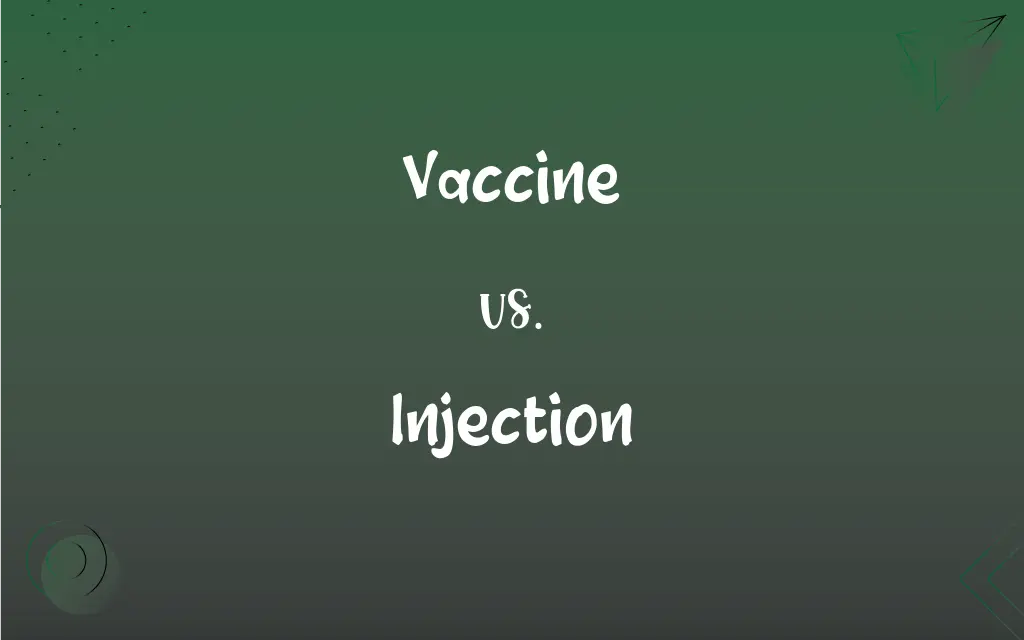Vaccine vs. Injection: What's the Difference?
Edited by Harlon Moss || By Janet White || Published on February 19, 2024
Vaccine is a substance used to stimulate the production of antibodies and provide immunity against diseases. Injection is a method of delivering liquid substances into the body through a needle and syringe.

Key Differences
A vaccine is a biological preparation that provides active acquired immunity to a particular disease, typically containing an agent resembling a disease-causing microorganism. An injection, however, is a method of administering drugs or vaccines into the body using a needle and syringe.
Vaccines work by stimulating the immune system to recognize and fight pathogens. In contrast, injections are a delivery method that can be used for various medical substances, not just vaccines.
The purpose of a vaccine is to prevent disease by triggering an immune response. Injections, on the other hand, can be used for various purposes including vaccination, medication delivery, or even nutritional supplementation.
Vaccines are typically administered via injection, but can also be given orally or nasally. Injections, however, are not limited to vaccines and can include antibiotics, pain relievers, and other medications.
The development of a vaccine involves extensive research and testing to ensure safety and efficacy. The technique of injection, while also requiring safety protocols, is more focused on the correct delivery method of various substances.
ADVERTISEMENT
Comparison Chart
Definition
Biological preparation for immunity
Method of administering substances into the body
Primary Purpose
To stimulate immune response and prevent disease
To deliver drugs, vaccines, or other substances
Types
Various vaccines for different diseases
Can include vaccines, medications, etc.
Administration Method
Often through injection, but also orally or nasally
Primarily through a needle and syringe
Focus in Development
Safety and efficacy for disease prevention
Safe and effective delivery of substances
ADVERTISEMENT
Vaccine and Injection Definitions
Vaccine
A vaccine works by mimicking a natural infection to stimulate an immune response.
The measles vaccine triggers an immune response without causing the actual disease.
Injection
Injections are used for rapid delivery of drugs into the bloodstream.
Emergency medication for allergic reactions is given via injection.
Vaccine
A vaccine is a substance used to stimulate immunity against a specific disease.
The flu vaccine is administered annually to protect against influenza.
Injection
Injections can be given intravenously, intramuscularly, or subcutaneously.
Insulin is often administered through a subcutaneous injection.
Vaccine
Vaccines can be administered via injection, orally, or nasally.
The rotavirus vaccine is given orally to infants.
Injection
An injection is a method of delivering medication or vaccines into the body.
The doctor gave an injection of antibiotics to treat the infection.
Vaccine
Vaccination is a key public health tool for disease prevention.
Widespread vaccination has led to the eradication of smallpox.
Injection
Injections can be used for vaccines, medications, and other treatments.
A B12 vitamin injection is sometimes given for nutritional deficiencies.
Vaccine
Vaccines often contain weakened or killed forms of the disease-causing organism.
The polio vaccine uses an inactivated virus to build immunity.
Injection
The process involves using a syringe and a needle to introduce the substance.
The nurse prepared an injection for the patient’s pain relief.
Vaccine
A preparation of a weakened or killed pathogen, such as a bacterium or virus, or of a portion of the pathogen's structure, that is administered to prevent or treat infection by the pathogen and that functions by stimulating the production of an immune response.
Injection
The act of injecting.
Vaccine
A preparation from the cowpox virus that protects against smallpox when administered to an individual.
Injection
Something that is injected, especially a dose of liquid medicine injected into the body.
FAQs
Can all vaccines be given orally?
No, many vaccines require injection, though some can be given orally or nasally.
Are injections only for vaccines?
No, injections can deliver various types of medications and treatments.
What is an injection?
A method for administering substances like drugs or vaccines into the body.
How do vaccines work?
They stimulate the immune system to recognize and fight specific pathogens.
How is an injection administered?
Using a syringe and needle, injected into the muscle, skin, or vein.
What is a vaccine?
A biological preparation that stimulates immunity against a specific disease.
What are the types of injections?
Intravenous, intramuscular, and subcutaneous are common types.
Are injections painful?
They can be, but the discomfort is usually brief.
What's an intramuscular injection?
An injection given directly into a muscle.
How are vaccines developed?
Through extensive research, testing, and clinical trials for safety and efficacy.
Are vaccines safe?
Yes, they undergo rigorous testing and monitoring for safety.
Can anyone receive a vaccine?
Most people can, but some with specific allergies or conditions may not.
What substances can be administered by injection?
Medications, vaccines, nutritional supplements, and more.
Are vaccine side effects common?
Minor side effects like soreness are common, but serious side effects are rare.
What's the difference between a vaccine and a regular injection?
A vaccine stimulates immunity against diseases, while an injection is a delivery method.
Can vaccines cause the diseases they're meant to prevent?
Typically no, most vaccines use inactivated or attenuated agents.
How often should vaccines be administered?
It depends on the vaccine; some require boosters or annual administration.
What is a subcutaneous injection?
An injection given under the skin.
Do injections provide immediate effects?
For some medications, yes, but vaccines often require time to develop immunity.
Are there alternatives to needle injections?
For some treatments, yes, like oral medications or nasal sprays.
About Author
Written by
Janet WhiteJanet White has been an esteemed writer and blogger for Difference Wiki. Holding a Master's degree in Science and Medical Journalism from the prestigious Boston University, she has consistently demonstrated her expertise and passion for her field. When she's not immersed in her work, Janet relishes her time exercising, delving into a good book, and cherishing moments with friends and family.
Edited by
Harlon MossHarlon is a seasoned quality moderator and accomplished content writer for Difference Wiki. An alumnus of the prestigious University of California, he earned his degree in Computer Science. Leveraging his academic background, Harlon brings a meticulous and informed perspective to his work, ensuring content accuracy and excellence.
































































